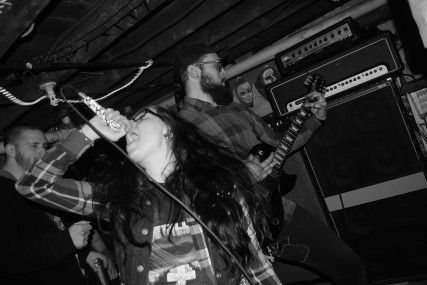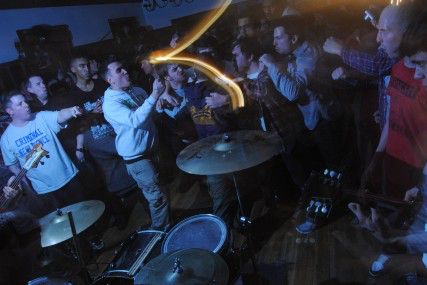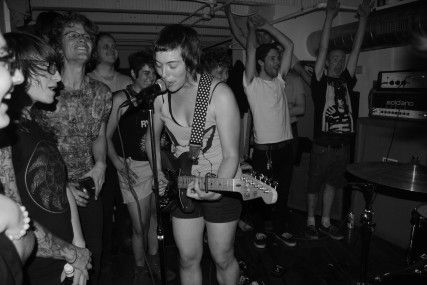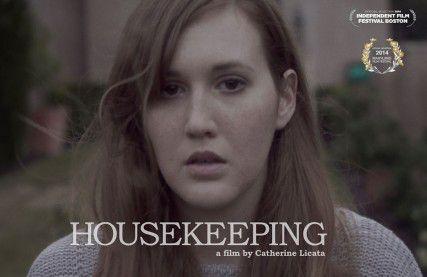Do-it-yourself culture lives on in the Boston community.

On April 20, Ceremony, a California hardcore band, played a sold out show at the Democracy Center in Cambridge. This is not abnormal; Ceremony plays sold out shows all the time. What was different is the context. The band is now signed to large independent label Matador Records. They are getting more exposure then they ever have. There were far more people trying to see them then there was room in the Democracy Center that night. Thanks to their growing fan base, Ceremony have gotten a bit to big for venues like the Democracy Center.
THE SCENE
In the punk world, the DIY scene centers around anti-consumerism and the ability to express oneself off of limited resources. It’s associated with music and activism, among other things.
The phenomenon of the Democracy Center is rare. It is, by all accounts, a real venue. It may be small, and there may be no stage or sound booth, but it is legal. Many other DIY shows—held in spaces such as What We Talk About When We Talk About Us and The Secret House of Pancakes, which are two basement venues in Allston—are illegal according to Massachusetts law.
At a typical basement show, guests might get a mark on their hands to indicate that they paid to get in. The bands that they have come to see might not even be on a label—many of them release their music themselves.
“The Democracy Center is legal, which is great. But these other spaces, they’re in warehouses and stuff. The cops can come and shut them down if they want,” said Ali Donohue, a College of Communication senior and the music director at WTBU. “Usually it doesn’t happen, because [the cops] have bigger fish to fry, but it is an issue.”
Donohue said she has been involved in the DIY scene for a long time. She originally became a part of it when she was living outside of New Brunswick, N.J., which she said is legendary for its basement shows. When Donohue came to BU in 2008, she said she was looking a similar experience.
“I didn’t feel socially connected, and I was looking for something like I did back in New Jersey, which was just go to shows all the time. So, I started hearing about basement shows and going to those,” Donohue said.
COMMUNITY EXPERIENCE
Donohue’s experience is not unique. Many people in Boston—and in other cities across the country—are drawn to DIY shows for the community, as much as they drawn to the music.
“Initially it was just the music,” said Rani Gupta, a junior in COM. “But then you start talking to people and getting to know them. You start talking about your different views, and then you realize that you have a lot of the same views on things.”
Gupta admitted she’s still meeting new people, but for her, DIY is something much more than going to shows in nontraditional spaces.
“It’s not just music. I think for people who just think that DIY is just a style of music, I think that’s really inaccurate,” Gupta said. “DIY is everything. It’s choosing not to go to big chain stores. It’s choosing to not use certain oppressive language, whether it be transphobic, homophobic [or] racist language.”
Gupta said she works actively as a part of the Center for Gender, Sexuality and Activism at Boston University. She said the idea of resisting oppression is incredibly important to her, and the DIY ethos ties into that.
“As a whole, DIY is resisting different forms of oppression. That’s what it is to me, at least,” Gupta said.

DIY means something different to everyone, but almost everyone agrees it’s not just about the music. While the music is important, the activism is just as important.
Donohue was involved in planning the second annual Smash It Dead Fest, which raised money for the Boston Area Rape Crisis Center. It ran in various spaces around Allston and Cambridge. More important than the music, Donohue said, was the attention they were able to bring to BARCC and the amount of money they raised, which was about $4,300.
Smash it Dead Fest featured mostly punk and hardcore bands, but punk bands are not the only ones putting on shows in Boston basements.
BOOKING IT
Liz Pelly, a COM grad who write for the Boston Phoenix, said she’s been booking shows since 2010. Originally, she booked them on her own in her living room and at local venue Great Scott, but she has since teamed up with her friends from Lorem Ipsum Books in Cambridge to form a sort of booking collective. A DIT—or Do it Together—philosophy, as she calls it.
“There’s also a community of people in Boston who are into experimental electronic but who have the same sort of punk, grassroots ethos, which is pretty fun,” Pelly said.
Pelly said she works with some of the Boston-based members of the FMLY collective—a group of artists whose music tends to be much more experimental than that of the average garage punk band.
It turns out that Boston, a city long known for its hardcore and punk scenes, has a little bit of everything. A lot of this is due to Boston’s youth population constantly revolving. It means that not many bands stay together for more than a few years and most that are serious about making a career out of it tend to move to New York.
“I think that it’s really great that there are so many people coming and going because you get to meet new people all the time,” Pelly said.

The bands and basements may come and go, but there’s always going to be something going on. When there’s something going on, there’s a community of people behind it. A community that allows everybody—whether it’s a scared college freshman or a graduate in their mid-20s—to be part of something.
The phrase “DIY” is actually quite strange. Truth is, most people in Boston tend to do it together. The people who live here all tend to agree, there’s simply something about Boston that makes it a great place to make music, go to shows, help causes and be a part of a community.
“There’s a lot of music happening here,” Donohue said. “There’s a lot of cool people making things happen and I’m just…I’m glad to be in Boston.”


















































































































Sizzle • May 2, 2012 at 4:10 pm
This article is so dumb; do your research next time.